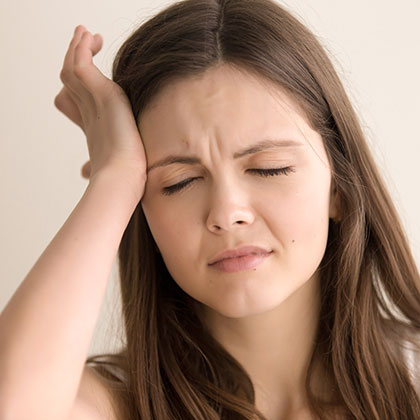According to the British Thyroid Foundation, thyroid disorders affect one in 20 people in the UK (i). But what is the thyroid gland and what is its function?
Your thyroid is a butterfly-shaped gland found in your neck, just above the sternum (breast bone) and below your Adam’s apple. It has two lobes - the right and left – that are located on each side of your windpipe and joined together by the isthmus, a small bridge-like section of thyroid tissue.
What does it do?
Your thyroid is an endocrine gland, which means it belongs to your body’s endocrine system. Glands of the endocrine system are important because they release hormones, with other endocrine glands including the adrenal glands, the pancreas, the pituitary gland, the ovaries, the testes and the hypothalamus. The hormones your thyroid secretes into your blood are thyroxine and triiodothyronine. These hormones are also called T4 and T3 respectively, as thyroxine contains four atoms of iodine while triiodothyronine contains three. Once released, T4 is converted in the body to T3, which is essential for the normal working – or metabolism – of all your cells and tissues. The British Thyroid Foundation describes this function as regulating the speed with which your body cells work (i).
The thyroid is controlled by the pituitary gland – a small gland found in your head, beneath your brain. This regulates the amount of T4 and T3 your thyroid gland secretes, so it’s responsible for making sure your thyroid produces just the right amount of hormones your body needs. When your thyroid starts to produce too little T3 and T4, the pituitary gland releases a hormone to make your thyroid work harder, called thyroid stimulating hormone. If your thyroid produces too much T3 and T4, the pituitary gland stops releasing thyroid stimulating hormone, which allows your thyroid to slow down.
When something happens to disrupt the normal working of the thyroid – and there are many different things that can cause this – the result can be one of several disorders that may trigger a range of symptoms.
Types of thyroid disorders
The most common types of thyroid disorders are hypothyroidism (or underactive thyroid) and hyperthyroidism (overactive thyroid):
Underactive thyroid
While this affects both sexes, it’s more common in women than in men (according to Patient, one to two people in every 100 in the UK have hypothyroidism, with the condition affecting 10 times more women than men (ii) ). It happens when your thyroid doesn’t produce enough of the hormone thyroxine (T4), with most cases caused by the immune system attacking and damaging the thyroid (autoimmune thyroiditis). Having a lack of iodine in your diet can also cause an underactive thyroid, as iodine is needed by the body to make T4 – though iodine deficiency is rare in the UK.
If you have an underactive thyroid, you may experience symptoms such as fatigue, sensitivity to the cold, constipation, depression, weight gain, muscle aches and pains, dry skin, brittle hair and nails, carpal tunnel syndrome and a low sex drive. Some people may not have any obvious symptoms, or their symptoms develop so slowly they don’t notice them. If left untreated, you may have a higher risk of developing cardiovascular disease, as having an underactive thyroid can increase your cholesterol levels. During pregnancy, an underactive thyroid can increase your risk of several conditions including pre-eclampsia, anaemia and problems that affect your baby. Learn more about common pregnancy health concerns in our helpful guide.
Overactive thyroid
If, on the other hand, your thyroid produces too much T4 or the other thyroid hormone triiodothyronine (T3), your thyroid is said to be overactive. Again, women are affected more than men, with one in 50 women in the UK estimated to have an overactive thyroid (10 times the number of men) (iii).
Several conditions can lead to an overactive thyroid, the most common of which is Graves’ disease. This autoimmune condition attacks the thyroid gland, leading to an overproduction of hormones. Graves’ disease can run in families and is more likely it you smoke. About half of people with Graves’ disease also develop thyroid eye disease (TED), where inflammation in the eye muscles and in the tissues behind the eyes pushes the eyes forward, making them look more prominent (iii).
The most common symptoms of an overactive thyroid include hyperactivity, insomnia, mood swings, unexplained weight loss, muscle weakness, increased sensitivity to heat, infertility, fatigue and a low sex drive. You may also have a fast heart rate, hair loss (alopecia), twitching in your face and limbs, and your skin may feel warm and moist.
Other thyroid disorders include thyroiditis, which is inflammation of the thyroid gland. There are several types of thyroiditis, with some including viral or sub-acute thyroiditis and postpartum thyroiditis being temporary conditions. Autoimmune thyroiditis, meanwhile, may lead to permanent thyroid damage. All types cause either high or low levels of thyroid hormones. Thyroid cancer is rare and has a high cure rate, with symptoms including a lump in the neck, difficulty swallowing and a hoarse voice.
Treatments for thyroid disorders
If you have a diagnosis of an underactive or overactive thyroid, there are treatments that can restore a normal level of thyroid hormones in your body:
Treating an underactive thyroid
Hypothyroidism is usually treated with a daily tablet called levothyroxine that’s prescribed for you by your GP. This is a synthetic form of the thyroxine (T4) that your thyroid gland produces naturally, and it simply replaces the amount of T4 your thyroid gland isn’t making. The trick with levothyroxine is to find the right amount that you need, and you may find you’ll have to try different doses before you start to feel better. For instance, you may start on a low dose, but it may be gradually increased if blood tests show your thyroid hormone levels are still less than normal. It’s important to get the dosage right, because taking too much levothyroxine can cause side effects such as a rapid heart rate, chest pain, headaches, diarrhoea, vomiting and sweating.
Treating an overactive thyroid
If you have hyperthyroidism, a hospital specialist called an endocrinologist will usually supervise your treatment, rather than your GP. There are three treatments widely used for overactive thyroid:
-
Thionamides - are medicines that prevent your thyroid gland from making too much T4 or T3 (the other hormone your thyroid gland secrets, called triiodothyronine). These may take a while to work, so you may not notice any improvement in your symptoms for several weeks. Side effects are common, including a skin rash and joint pain, but these usually pass as your body gets used to the treatment.
-
Beta-blockers - may help when you first start taking thionamides as they can relieve some of the symptoms of hyperthyroidism before the thionamides take effect. These medicines are often prescribed for heart problems such as high blood pressure, angina and heart failure.
-
Radioiodine treatment - either in the form of a capsule or a drink – may be recommended to shrink your thyroid gland. However, it’s not suitable if you are pregnant or if you have thyroid eye disease (TED). Unlike thionamides, which you usually have to take for a long period of time, radioiodine treatment is usually given in one or two doses. However, there is a chance your thyroid will become underactive as a result of radioiodine treatment
-
Surgery - is also an option in cases where your thyroid gland is severely swollen (causing a lump in your neck called a goitre), if your symptoms return after taking a course of thionamides, or if you cannot have radioiodone treatment. Part or all of your thyroid gland may be removed, which means you’ll need to take levothyroxine to replace your thyroid hormones on a permanent basis.
Diet and your thyroid
Many nutrition experts believe certain foods, as part of a balanced diet, may help support your thyroid and keep it healthy. Here’s a quick rundown of what you should be eating – as well as what you should avoid if you already have a thyroid disorder:
Iodine is arguably the most important mineral for your thyroid gland, so keep yours healthy by eating fish, seafood and seaweed, all of which are good sources. If, however, you have a thyroid disorder, it’s advisable to avoid eating excessive amounts of iodine-rich foods.
Nuts
Brazil nuts and other nuts contain selenium, a mineral that’s essential for healthy thyroid function. It’s thought to help regulate thyroid hormone production and support the conversion of the thyroid hormone thyroxine (T4) into the biologically active thyroid hormone triiodothyronine (T3). Other foods that contain selenium include seeds, oysters, tuna, pork, beef, onions, and garlic.
Dairy foods
If you take medication for an underactive thyroid, avoid eating foods rich in calcium – such as milk, cheese and yoghurt – at the same time as you take your levothyroxine tablet. Calcium interferes with the absorption of levothyroxine, and the British Thyroid Foundation recommends leaving a gap of four hours between taking levothyroxine and eating foods or taking supplements that contain calcium (iv). Iron supplements may also prevent your body from absorbing levothyroxine, so leave a gap of two hours between the two (remember some multivitamin and mineral supplements also contain iron) (iv).
Soya foods
Like foods that contain calcium, soya foods such as tofu, soya milk and soya beans also affect the absorption of levothyroxine, so leave as much time as possible between taking your levothyroxine and eating foods containing soya (the British Thyroid Foundation recommends avoiding soya altogether) (iv).
Cruciferous vegetables
Members of the brassica plant family – including cabbage, cauliflower, broccoli, kale and Brussel sprouts – contain substances called goitrogens that affect the thyroid gland and interfere with its ability to release thyroid hormones. This explains why people with thyroid disorders are often advised to avoid eating such foods. However, experts believe that you’d have to eat quite a lot of them before they’d start to cause any real problems (v).
Natural remedies to support your thyroid
As well as having a healthy balanced diet, there are some nutritional supplements you could take to support your thyroid gland, including the following:
Selenium
Studies suggest that taking a selenium supplement may offer benefits to people who have an underactive thyroid. One review of studies into selenium and thyroid disease has found that selenium supplements may be beneficial for people with autoimmune thyroiditis as well as TED, and that maintaining selenium levels is important to prevent thyroid disease (v). Another has found those who take selenium have lower blood levels of antibodies that attack the thyroid (vi). The European Food Safety Authority (EFSA) has also upheld the claim that selenium contributes to normal thyroid function (vii).
Multivitamin and mineral
A general multivitamin and mineral supplement may help support your overall health if you have an overactive or underactive thyroid, as nutrients that are important for thyroid health include vitamins C, E and B complex. Most B vitamins, as well as magnesium, are also essential for energy, which may help if you experience fatigue as a result of having an underactive or overactive thyroid.
However, if you have an underactive thyroid and are thinking of taking a multivitamin and mineral supplement that contains iron and/or calcium, don’t take it at the same time as your levothyroxine tablet (the treatment for hypothyroidism). Leave at gap of at least a few hours between taking the two, as calcium and iron can affect your body’s ability to absorb levothyroxine.
Kelp
If you are iodine deficient, iodine-containing supplements such as kelp may help, and the EFSA backs claims that iodine contributes to normal thyroid function (viii). According to the British Dietetic Association, if you don’t eat enough iodine-rich foods a supplement may be helpful – though according to the NHS iodine deficiency isn’t common in the UK (ix). If you have a thyroid condition, however, or if you’re taking any other medication, speak to your GP before taking additional iodine.
Green tea/coffee
One of the common symptoms of an underactive thyroid is weight gain. Supplements that may help to control weight and help with weight loss include those that contain green tea and green coffee extract. There is some evidence that green tea extract may help with weigh reduction (x), while green coffee extract also shows promise as a weight-loss aid (xi), arguably because it contains a substance called chlorogenic acid (xii).
Glucomannan
A form of water-soluble fibre made from the root of the konjac plant, glucomannan may also help with weight loss (xiii). It’s thought to work by expanding in the stomach and helping you to feel full. Very low-calorie foods made from glucomannan, including ‘skinny’ noodles and pasta, are also becoming popular.
Conjugated linoleic acid
CLA is a mixture of different chemical forms (or isomers) of linoleic acid – an essential fatty acid. It too may be helpful for those who have gained weight as a result of a thyroid disorder, as there’s evidence that it may help to reduce body fat levels (xiv).
Fish oils
Depression is one of the symptoms of an underactive thyroid, but taking a fish oil supplement be useful. There is evidence to suggest that the omega-3 fatty acids found in fish oils may be more effective in treating depression than a placebo (xv). You may also want to consider taking a supplement containing 5-hydroxytryptophan (5-HTP). This non-essential amino acid has been shown to be as effective as some standard antidepressants (xvi).
If you’re a vegetarian or vegan you can still benefit from an omega-3 supplement, thanks to the availability of products that contain the natural triglyceride (TG) form of omega-3, which is sourced from plant organisms called microalgae rather than fish.
If you think you have the symptoms of a thyroid disorder, there’s no need to worry. Simple tests can be carried out and you can be referred to a specialist by your GP. For more articles on other common health conditions, simply visit our health library.
References:
-
Available online: https://www.btf-thyroid.org/what-is-thyroid-disorder
-
Available online: https://patient.info/hormones/thyroid-and-parathyroid-glands/underactive-thyroid-gland-hypothyroidism
-
Available online: https://patient.info/hormones/overactive-thyroid-gland-hyperthyroidism
-
Available online: https://www.btf-thyroid.org/thyroid-and-diet-factsheet
-
Ventura. M, Melo. M, Carrilho. F. Selenium and Thyroid Disease: From Pathophysiology to Treatment. Int J Endocrinol. 2017;2017: 1297658..Available online: https://www.ncbi.nlm.nih.gov/pmc/articles/PMC5307254/
-
Toulis. KA, Anastasilakis. AD, Tzellos. TG, Goulis. DG, Kouvelas. D. Selenium supplementation in the treatment of Hashimoto's thyroiditis: a systematic review and a meta-analysis. Thyroid. 2010 ;20(10):1163-1173.
-
Available online: https://efsa.onlinelibrary.wiley.com/doi/10.2903/j.efsa.2010.1727
-
Available online: https://efsa.onlinelibrary.wiley.com/doi/10.2903/j.efsa.2014.3516
-
Available online: https://www.bda.uk.com/foodfacts/Iodine.pdf
-
Auvichayapat. P, Prapochanung. M, Tunkamnerdthai. O. Effectiveness of green tea on weight reduction in obese Thais: A randomized, controlled trial. Physiol Behav. 2007 Oct 18.
-
Chandra. RK, Trace element regulation of immunity and infection. J Am Coll Nutr. 1985;4:5-16.
-
Shimoda. H, Seki. E, Aitani. M. Inhibitory effect of green coffee bean extract on fat accumulation and body weight gain in mice. BMC Complementary and Alternative Medicine. 2006;6:9.
-
Arion. WJ, Canfield. WK, Ramos. FC, et al. Chlorogenic acid and hydroxynitrobenzaldehyde: new inhibitors of hepatic glucose 6-phosphatase. Arch Biochem Biophys. 1997;339:315–322.
-
Walsh. DE, Yaghoubian. V, Behforooz. A. Effect of glucomannan on obese patients: a clinical study. Int J Obes. 1984;8:289-293.
-
Whigham. LD, Watras. AC, Schoeller. DA. Efficacy of conjugated linoleic acid for reducing fat mass: a meta-analysis in humans. J Am J Clin Nutr. 2007;85:1203-1211.
-
den Hartigh LJ. et al., Conjugated LInoleic Acid Effects on Cancer, Obesity and Atherosclerosis: A Review of Pre-Clinical and Human Trials with Current Perspectives. Nutrients. 2019 Feb 11;11(2):pii E370. Available online: https://www.ncbi.nlm.nih.gov/pubmed/30754681
-
Rondanelli. M, Giacosa. A, et al. Effect of omega-3 fatty acids supplementation on depressive symptoms and on health-related quality of life in the treatment of elderly women with depression: a double-blind, placebo-controlled, randomized clinical trial. . J Am Coll Nutr. 2010 Feb;29(1):55-64.
-
Hallahan B. et al., Efficacy of omega-3 highly unsaturated acids in the treatment of depression. Br J Psychiatry. 2016 Sep;209(3): 192-201. Available online: https://www.ncbi.nlm.nih.gov/pubmed/27103682
-
Byerley. WF, Judd. LL, Reimherr. FW, et al. 5-hydroxytryptophan: a review of its antidepressant efficacy and adverse effects. J Clin Psychopharmacol. 1987;7:127-137. Poldinger. D, Calanchini. B, Schwarz. W. A functional-dimensional approach to depression: Serotonin deficiency as a target syndrome in a comparison of 5-hydroxytryptophan and fluvoxamine. Psychopathology. 1991;24:53-81.
Related Posts
Disclaimer: The information presented by Nature's Best is for informational purposes only. It is based on scientific studies (human, animal, or in vitro), clinical experience, or traditional usage as cited in each article. The results reported may not necessarily occur in all individuals. Self-treatment is not recommended for life-threatening conditions that require medical treatment under a doctor's care. For many of the conditions discussed, treatment with prescription or over the counter medication is also available. Consult your doctor, practitioner, and/or pharmacist for any health problem and before using any supplements or before making any changes in prescribed medications.

Christine
Christine Morgan has been a freelance health and wellbeing journalist for almost 20 years, having written for numerous publications including the Daily Mirror, S Magazine, Top Sante, Healthy, Woman & Home, Zest, Allergy, Healthy Times and Pregnancy & Birth; she has also edited several titles such as Women’ Health, Shine’s Real Health & Beauty and All About Health.
View More



